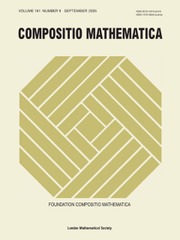-
- Get access
- Contains open access
- ISSN: 0010-437X (Print), 1570-5846 (Online)
- Editors: Fabrizio Andreatta Università degli Studi di Milano "La Statale", Italy, David Holmes Universiteit Leiden, The Netherlands, Nick Sheridan University of Edinburgh, UK, and Eric Vasserot IMJ-PRG, Université Paris Diderot, France
- Editorial board
Founded in 1935, Compositio Mathematica publishes first-class research papers in pure mathematics. All contributions are required to meet high standards of quality and originality and are carefully screened byexperts in the field.
Papers published before 1997 are available from the NUMDAM website.
Compositio is owned and published by non-profit organisations (the Foundation Compositio Mathematica and the London Mathematical Society) that use any surplus income from the journal to sponsor mathematics and mathematical research.
Papers published before 1997 are available from the NUMDAM website.
Compositio is owned and published by non-profit organisations (the Foundation Compositio Mathematica and the London Mathematical Society) that use any surplus income from the journal to sponsor mathematics and mathematical research.
Recently published articles
Mathematics blog entries

-
Compositio Mathematica authors to receive 2025 Frontiers of Science award
- 30 October 2025,
- Compositio Mathematica is thrilled to congratulate Luisa Fiorot, Teresa Monteiro Fernandes, and Claude Sabbah on receiving a prestigious 2025 Frontiers of Science...

-
A free boundary model for transport-induced neurite growth
- 12 December 2024,
- Understanding the mechanisms of neuronal development is vital for elucidating the intricate processes that govern the nervous system. In a neuron’s final...

-
New research explores collaborative population dynamics of plants and insects
- 20 August 2024,
- Understanding the evolution of nature through a model describing collaborative population dynamics of plants and insects.


Twitter